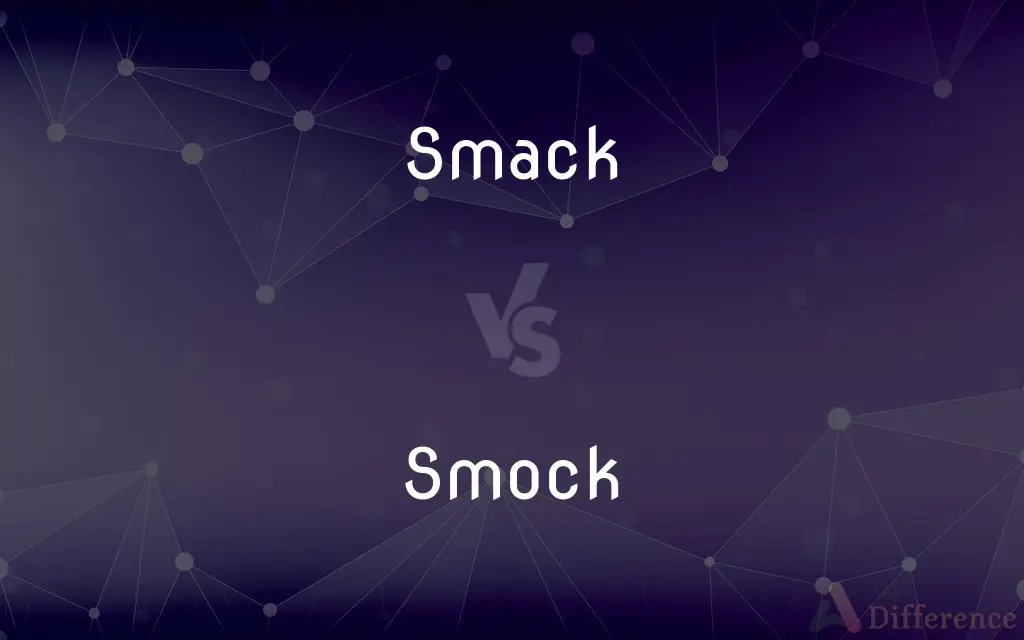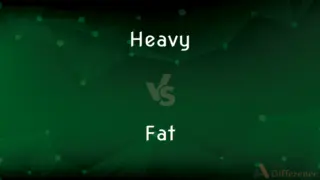Smack vs. Smock — What's the Difference?
By Tayyaba Rehman — Updated on November 7, 2023
Smack refers to a sharp, crisp slap or blow, a loud noise produced by such a hit, or a slight trace of something. Smock is a protective loose garment worn over clothes to prevent damage, commonly used by painters.

Difference Between Smack and Smock
Table of Contents
ADVERTISEMENT
Key Differences
Smack refers to a sharp, often loud slap or blow typically given with the hand. When someone gets hit with a smack, it suggests a quick and possibly harsh impact. The sound of a smack is distinctive, often associated with a sharp, slapping noise. Conversely, a smock is a type of clothing, an overgarment that's usually loose and worn to protect the clothes underneath. One would wear a smock while painting or doing any messy work to avoid staining their clothes.
While smack is most commonly used to describe the act of hitting or the sound associated with it, it can also convey the notion of a slight taste or flavor, or doing something with a sudden audible impact. Smock, on the other hand, is quite specific in its application; it has a utilitarian purpose, designed to be worn over regular clothes to shield them from getting dirty, without any connotations of sound or taste.
Smack, in another context, can be a noun describing a specific taste or flavor, as in "a smack of garlic". It can also be a verb indicating hitting with an open hand. Smock doesn't share this variety and maintains its singular meaning as a noun, signifying a protective garment. Therefore, you might taste a smack of something but never a smock, and you could smock your clothes, but not smack them in this sense.
If we consider slang usage, "smack" can also mean to kiss noisily or to have a characteristic taste or flavor, or it can be a street name for heroin. "Smock" has no such alternative meanings in slang or colloquial use. Smack has versatility in language that smock does not possess.
In summary, while "smack" can be a verb or a noun with several meanings including a blow, a sound, or a taste, "smock" is strictly a noun with a singular utilitarian meaning in clothing. Their only commonality is phonetic; they start with 'sm' and are single-syllable words, but their meanings and uses are entirely distinct.
ADVERTISEMENT
Comparison Chart
Part of Speech
Can be a noun or a verb
Noun only
Meaning
Blow, sound, taste, or a trace of something
Protective garment
Usage in a Sentence
Often implies action or impact
Refers to an item of clothing
Slang Meanings
Can mean to kiss noisily or be slang for heroin
No known slang meanings
Variations in Meaning
Has multiple meanings depending on context
Has a single, specific meaning
Compare with Definitions
Smack
A sharp slap or blow, typically with the hand.
He gave the misbehaving dog a light smack on the nose.
Smock
A protective garment worn over clothes for dirty work.
The artist donned her smock before starting to paint.
Smack
To hit sharply and with a loud noise.
She smacked the table in frustration.
Smock
Historical loose outer garment worn by rural workers.
The shepherd wore an old woolen smock on cold mornings.
Smack
A distinct taste or flavor.
There was a smack of lemon in the recipe.
Smock
A loose dress or blouse, with the upper part gathered in smocking.
She wore a traditional embroidered smock to the folk festival.
Smack
A sharp slap or blow, typically one given with the palm of the hand
She gave Mark a smack across the face
Smock
A garment worn by infants or young children.
The toddler's smock was covered in mud from playing in the garden.
Smack
A flavour or taste of
Anything with even a modest smack of hops dries the palate
Smock
A woman's or child's loose-fitting dress or blouse.
Her summer wardrobe included a light, cotton smock.
Smack
A single-masted sailing boat used for coasting or fishing
The village still harbours a few fishing smacks
Smock
A loose coatlike outer garment, often worn to protect the clothes while working.
Smack
Heroin
I was out scoring smack
Smock
To clothe in a smock.
Smack
Strike (someone or something), typically with the palm of the hand and as a punishment
Jessica smacked his face, quite hard
Smock
To decorate (fabric) with smocking.
Smack
Part (one's lips) noisily in eager anticipation or enjoyment of food or drink
Morgan drank half the Scotch and smacked his lips
Smock
A type of undergarment worn by women; a shift or slip.
Smack
Crack (a whip)
The four postilions smacked their whips in concert
Smock
A blouse; a smock frock.
Smack
Have a flavour of; taste of
The tea smacked strongly of tannin
Smock
A loose garment worn as protection by a painter, etc.
Smack
In a sudden and violent way
I ran smack into the back of a parked truck
Smock
Of or pertaining to a smock; resembling a smock
Smack
Exactly; precisely
Our mother's house was smack in the middle of the city
Smock
Hence, of or pertaining to a woman.
Smack
To press together and open (the lips) quickly and noisily, as in eating or tasting.
Smock
(transitive) To provide with, or clothe in, a smock or a smock frock.
Smack
To kiss noisily.
Smock
To apply smocking.
Smack
To strike sharply and with a loud noise.
Smock
A woman's under-garment; a shift; a chemise.
In her smock, with head and foot all bare.
Smack
To make or give a smack.
Smock
A blouse; a smoock frock.
Smack
To collide sharply and noisily
The ball smacked against the side of the house.
Smock
Of or pertaining to a smock; resembling a smock; hence, of or pertaining to a woman.
Smack
To have a distinctive flavor or taste. Used with of.
Smock
To provide with, or clothe in, a smock or a smock frock.
Smack
To give an indication; be suggestive. Often used with of
"an agenda that does not smack of compromise" (Time).
Smock
A loose coverall (coat or frock) reaching down to the ankles
Smack
The loud sharp sound of smacking.
Smock
Embellish by sewing in lines crossing each other diagonally;
The folk dancers wore smocked shirts
Smack
A noisy kiss.
Smack
A sharp blow or slap.
Smack
A distinctive flavor or taste.
Smack
A suggestion or trace.
Smack
A small amount; a smattering.
Smack
A fishing boat sailing under various rigs, according to size, and often having a well used to transport the catch to market.
Smack
Heroin.
Smack
With a smack
Fell smack on her head.
Smack
Directly
"We were smack in the middle of another controversy about a public man's personal life" (Ellen Goodman).
Smack
A distinct flavor, especially if slight.
Rice pudding with a smack of cinnamon
Smack
A slight trace of something; a smattering.
Smack
Heroin.
Smack
(Northern England) A form of fried potato; a scallop.
Smack
A small sailing vessel, commonly rigged as a sloop, used chiefly in the coasting and fishing trade and often called a fishing smack
Smack
A group of jellyfish.
Smack
A sharp blow; a slap. See also: spank.
Smack
The sound of a loud kiss.
Smack
A quick, sharp noise, as of the lips when suddenly separated, or of a whip.
Smack
(transitive) To get the flavor of.
Smack
(intransitive) To have a particular taste; used with of.
Smack
(intransitive) To indicate or suggest something; used with of.
Her reckless behavior smacks of pride.
Smack
To slap or hit someone.
Smack
To make a smacking sound.
Smack
(especially outside of North America) To strike a child (usually on the buttocks) as a form of discipline. (normal U.S. and Canadian term spank)
Smack
To wetly separate the lips, making a noise, after tasting something or in expectation of a treat.
Smack
To kiss with a close compression of the lips, so as to make a sound when they separate.
Smack
As if with a smack or slap; smartly; sharply.
Right smack bang in the middle.
Smack
A small sailing vessel, commonly rigged as a sloop, used chiefly in the coasting and fishing trade.
Smack
Taste or flavor, esp. a slight taste or flavor; savor; tincture; as, a smack of bitter in the medicine. Also used figuratively.
So quickly they have taken a smack in covetousness.
They felt the smack of this world.
Smack
A small quantity; a taste.
Smack
A loud kiss; a buss.
Smack
A quick, sharp noise, as of the lips when suddenly separated, or of a whip.
Smack
A quick, smart blow; a slap.
Smack
A slang term for heroin.
Smack
As if with a smack or slap.
Smack
To have a smack; to be tinctured with any particular taste.
Smack
To have or exhibit indications of the presence of any character or quality.
All sects, all ages, smack of this vice.
Smack
To kiss with a close compression of the lips, so as to make a sound when they separate; to kiss with a sharp noise; to buss.
Smack
To make a noise by the separation of the lips after tasting anything.
Smack
To kiss with a sharp noise; to buss.
Smack
To open, as the lips, with an inarticulate sound made by a quick compression and separation of the parts of the mouth; to make a noise with, as the lips, by separating them in the act of kissing or after tasting.
Drinking off the cup, and smacking his lips with an air of ineffable relish.
Smack
To make a sharp noise by striking; to crack; as, to smack a whip.
Smack
A blow from a flat object (as an open hand)
Smack
The taste experience when a savoury condiment is taken into the mouth
Smack
A sailing ship (usually rigged like a sloop or cutter) used in fishing and sailing along the coast
Smack
Street names for heroin
Smack
An enthusiastic kiss
Smack
The act of smacking something; a blow delivered with an open hand
Smack
Deliver a hard blow to;
The teacher smacked the student who had misbehaved
Smack
Have an element suggestive (of something);
His speeches smacked of racism
Smack
Have a distinctive or characteristic taste;
This tastes of nutmeg
Smack
Kiss lightly
Smack
Eat noisily by smacking one's lips
Smack
Directly;
He ran bang into the pole
Ran slap into her
Smack
To crash or bang with a loud noise.
The waves smacked against the hull of the boat.
Smack
The sound of a wet kiss.
The couple exchanged smacks in the quiet movie theater.
Common Curiosities
Does "smack" have different meanings in different contexts?
Yes, "smack" can mean a blow, a sound, a flavor, or slang for kissing or heroin.
Can "smack" and "smock" be used interchangeably?
No, they have different meanings and cannot be used interchangeably.
What parts of speech are "smack" and "smock"?
"Smack" can be both a noun and a verb, while "smock" is a noun.
Does "smock" have any slang meanings?
"Smock" does not have known slang meanings.
Is "smock" ever used to describe a sound?
No, "smock" refers to a type of clothing and not a sound.
Can "smack" indicate a flavor?
Yes, "smack" can indicate a slight but distinctive taste or flavor.
Can "smack" be used as an onomatopoeia?
Yes, "smack" is often used to describe the sound associated with a slap.
Could "smock" ever be a verb?
"Smock" is not commonly used as a verb in modern English.
How can you differentiate between "smack" and "smock" when spoken?
Context and pronunciation—'smack' has a shorter 'a' sound, while 'smock' has a longer 'o' sound.
Are there any specific settings where "smock" would be used?
"Smock" is often used in settings where clothes need protection, like painting or cooking.
What would be a historical use of "smock"?
Historically, a "smock" referred to a loose frock or outer garment worn by peasants or workers.
Are "smack" and "smock" related etymologically?
No, they have different etymological roots.
Is "smack" ever used in a positive context?
"Smack" can be positive when referring to a flavor or a loving kiss.
What would you wear a smock for?
You would wear a smock to protect your clothes during activities like painting.
Is a smock always a work garment?
Traditionally yes, but it can also be a casual or folk garment.
Share Your Discovery

Previous Comparison
Heavy vs. Fat
Next Comparison
Rise vs. AriseAuthor Spotlight
Written by
Tayyaba RehmanTayyaba Rehman is a distinguished writer, currently serving as a primary contributor to askdifference.com. As a researcher in semantics and etymology, Tayyaba's passion for the complexity of languages and their distinctions has found a perfect home on the platform. Tayyaba delves into the intricacies of language, distinguishing between commonly confused words and phrases, thereby providing clarity for readers worldwide.
















































